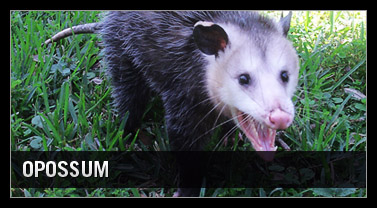Menu

As the weather turns colder, wild animals start seeking warmth and shelter. Not only can wildlife damage your home, but they can also expose you and your family to certain infectious diseases. These zoonotic diseases, which are those that can be transmitted from animals to humans, can be transmitted by live or dead animals and include rabies, hantavirus and toxoplasmosis. Luckily, keeping wild animals out of your house can be easier than getting rid of them after they’ve made themselves at home. The keys to wild animal control are blocking their potential points of access and removing their preferred sources of food, water and shelter. Although Wheeler’s Pest Control advises contacting a wildlife control professional to remove and/or exclude wild animals from your property, here are some tips that can help deter wildlife from entering your home. Nuisance Animals That May Invade Your Home Even in densely populated urban areas, these wild animals can be a common sight — and a frequent source of frustration for homeowners. Squirrels Opossums Skunks Raccoons Exclude Nuisance Animals from Your Home Protecting your home against wildlife starts with taking some preventative measures. To help control nuisance wildlife, start by inspecting the exterior of your home for potential entry points or having it inspected by a professional. Look for vents that has deteriorated or been damaged by the weather. Locate all holes and cracks. Many animals can squeeze through surprisingly tiny openings. Some of these animals can even make tiny openings bigger so they can squeeze through. Walk around the foundation of your home and look for openings and signs of animal activity where pipes, cables and vents exit the house. Foundation vents can be especially susceptible to wild animals. Repair any damaged vent screens, and consider installing vent covers to appropriate vents to discourage animal entry. Check your roof vents and chimney . Have a professional examine your roof, soffit, gutters and fascia yearly for damage. When looking for pest entry points, he or she should pay special attention to areas where the gables or dormers meet the roof line. The professional should also look for water damage that promotes wood rot, which makes it easier for wild animals to create or enlarge holes and enter your home. Have a professional install a commercial animal-proof chimney cap to help keep wildlife animals like bats, birds and squirrels out of your chimney. However, do not confuse this material with window-screening, as it can clog with soot and other debris, resulting in a serious fire hazard. Trim any overhanging tree branches and keep them at least 10 feet away from your roof. Tree squirrels, roof rats and other tree dwelling animals can use these branches as bridges into your home, especially if they are touching or resting on your roof. If you do discover any places where an animal has clawed or chewed its way inside or you want a professional to inspect for potential openings in the first place, contact a pest control specialist. Remove Sources of Food and Water Don’t feed squirrels, opossum, raccoons or other wildlife and don’t let fallen seed accumulate around your bird feeders. If possible, feed your pets inside. If you must feed them outside, bring their bowls inside at night and clean up any spilled food. Store your garbage in secure containers. Use a cord or weights to help secure the lids on your outdoor trash receptacles. Clean your grill regularly. Don’t put food scraps in your garden. Cover and secure any compost piles, and never add meat scraps or grease to your compost. If you garden, build a fence around your beds to help deter hungry animals, such as raccoons, rabbits, gophers, moles and even larger nuisance wildlife like deer. Also, don’t leave ripe fruit on the ground. Pick up fallen fruit and dispose of it properly. Eliminate Wildlife Shelters Store firewood away from buildings or fences. Stack it on a frame at least 2 feet off the ground to help prevent nesting in the wood pile or the soil below it. Doing so will also help protect your home from termite infestation. Remove dead trees, brush piles, tall grass or debris from your yard. Doing so can discourage wild animals from ever taking up residence on your property at all. Wild Animal Control Should these preparations not be enough to keep wild animals out of your attic, basement or any other area of your home, or if you want professional assistance from the start, Wheelers Pest Control can help. Our Trapping professionals know how to remove nuisance animals and how to keep them from coming back. Wheeler’s Pest Control Carriers a California State Trapping License. Call 951-681-2847 for all your Temecula-Murrieta Pest Control Needs.
Guys came on time did their job in a very professional way and we are very happy with their service.
Company is on top of their game David showed up to get are gophers. came out three days in a row haven’t seen a go for since
Joseph is a great ambassador for Wheeler's pest control, and a shout out to Daniel for dealing with my crazy schedule. Thanks guys!
A local business that everyone should support. All techs are knowledgeable, professional! FYI, they are also great w/ eradicating gophers as well!!